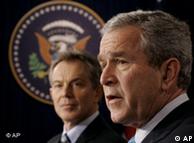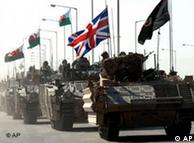.
(DW-world) – In an interview with the BBC, Blair said the US-led invasion was needed to topple Saddam Hussein, who he believed was dangerous even if he did not possess the nuclear, biological or chemical weapons as alleged.
“I would still have thought it right to remove him. Obviously you would have had to use and deploy different arguments, about the nature of the threat,” Blair told the broadcaster in comments released Saturday. The interview for the show “Fern Britton Meets…” aired yesterday.
Blair said Hussein and his government were “a threat to the region,” and that his decision was also influenced by Hussein’s willingness to use chemical weapons on “his own people” and by the stalling tactics he used against weapons inspectors.


How many lives were destroyed for Saddam's removal? (DW-world)
Comments spark criticism
But Blair’s comments have attracted strong criticism. Hans Blix, the head of the UN team that conducted weapons inspections in Iraq before the war, said he thought Blair used WMD as a “convenient justification” for war.
“Saddam’s removal was a gain but it’s the only gain that I can see from the war,” Blix said. The former UN weapons inspector said he believed Blair’s statement had a “strong impression of a lack of sincerity.”
The peace activism group Stop the War Coalition called Blair’s remarks “an admission of war crimes… It is an illegal act of aggression under international law to attack another country for the purposes of regime change.”
(The Independent) – After a conversation with John Wolf, Assistant US Secretary of State for Non-proliferation, who is accused of obtaining secret information from his office, he says: “I understood his formulations to say, ‘The witches exist; you are appointed to deal with these witches; testing whether there are witches is only a dilution of the witch-hunt’.”
His account is particularly damaging for Dick Cheney, the Vice-President who continued to insist that Iraq had “nuclear weapons” long after the evidence proved the contrary. Given Mr Blix’s IAEA background, he is well-placed to know that US statements about Iraq’s nuclear potential were “too alarming or exaggerated”.
In the light of the bugging revelations, he is clearly smarting. “Although it’s nice they were listening to us, why weren’t they paying attention to what we said? They might have learnt something.” Some leaders did believe the inspectors. Mr Blix says Jacques Chirac, the French President, had a healthy disrespect for intelligence. Although the French intelligence services were convinced WMD remained in Iraq, Mr Chirac’s thinking “seemed to be dominated by the conviction that Iraq did not pose a threat that justified armed intervention”.
Mr Chirac believed that the intelligence services “sometimes intoxicate each other”. So were the French right? “I think they were, yes. Chirac was right that the intelligence agencies intoxicated each other; I think they were right on the second resolution, they were right also in saying that one should defer, that one should have more inspections.
Mr Blair’s religious faith “really didn’t play a direct part” in his decision to go to war in Iraq, Mr Blair said in an interview to the Fern Britton of BBC, which I have just watched on television and now feel compelled to write about it.
Mr Blair volunteered his statement when he was asked by Ms Britton in the interview about squaring his Christian religious belief with the commandment prohibiting killing in view of the fact that he led the United Kingdom into wars in Sierra Leone, Kosovo, Iraq and Afghanistan.
Mr Blair ignored the question and changed the topic. It is a habit of politicians when asked to explain something which they cannot explain without losing face.
… Listening to Mr Blair’s interview was not pleasant. The man spoke as though words existed to disguise meaning. He seemed incapable of telling the truth except when he said that he avoided conversion to Catholicism whilst he was Prime Minister to avoid a hassle. It was one moment of honesty.
I was left with an overwhelming impression of a man who could not distinguish between truth and lies and someone who was prepared to lie about the reasons for taking a nation to war. There seemed no contrition for the hundreds of thousands who lost their lives in the war in Iraq.
"But I will not let myself be reduced to silence."




